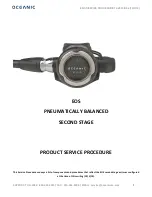
52 . STA 6000 Installation and Hardware GuideSTA 6000 Installation and Hardware Guide
Sensor Calibration
1.
In the Sensor Calibration screen of the calibration routine, enter a
Starting
Temperature
that is achievable with the coolant being used, and enter an appropriate
Ending Temperature
.
Suggested values are 30 and 1000 °C. The calibration will program the analyzer to take
measurements at nine equally-spaced isothermal points. This will take approximately
1 hour.
2.
Place an empty sample pan in the analyzer.
3.
Click
Run Calibration
.
4.
Follow the instructions on the screen.
5.
Click
Finish
and
Save
to save the sensor calibration.
DTA Baseline Optimization
This optimizes the DTA scanning baseline between two temperatures selected by the user.
The resultant DTA curve is fitted to an equation that flattens the baseline. The process takes
approximately 1 hour.
In the DTA baseline optimization screen, select the
Start Temperature
,
End
Temperature
and the
Scan Rate
, and then click
Run Calibration
.
Select start and end temperatures which include the range you will use for your
measurements. It is important to choose a start temperature below that which you will
use in experiments to ensure that the baseline optimization covers the full range of
temperatures needed. Suggested values are 30 and 1000 °C. Use a scan rate that you
plan to use for most analyses; suggested values are 10–20 °C/min.
Temperature and Heat Flow Verification
During normal use, it is usually only necessary to verify that the existing calibration gives
accurate data by running a test with a standard and checking that the temperature and heat
flow measurements agree with the accepted values. Indium is used to verify the temperature
and heat flow performance. An example of a suitable procedure is given below.
1.
Place an empty sample pan onto the sensor, and tare the weight of the empty pan.
2.
Place a piece of indium (10–20 mg) into the pan and record the weight.
3.
Create a method to heat the indium up to 200 °C at 20 °C/min.
4.
Start the method.
5.
After the data have been collected, calculate the onset temperature and heat flow for
the melting peak as follows:
–
Click
to open Data Analysis, and open the files of the experiments run using
the standards.
–
Perform a peak area and onset calculation by clicking
Calc > Peak Area
and
selecting the
Onset
box.
Summary of Contents for STA 6000
Page 1: ...STA 6000 Installation and Hardware Guide THERMAL ANALYSIS ...
Page 5: ...Introduction ...
Page 7: ...Safety and Regulatory Information ...
Page 17: ...Safety and Regulatory Information 17 ...
Page 18: ......
Page 19: ...Prepare the Laboratory ...
Page 22: ...22 STA 6000 Installation and Hardware GuideSTA 6000 Installation and Hardware Guide ...
Page 23: ...Install Multiple Analyzers ...
Page 26: ...26 STA 6000 Installation and Hardware GuideSTA 6000 Installation and Hardware Guide ...
Page 27: ...Install an STA 6000 ...
Page 54: ...54 STA 6000 Installation and Hardware GuideSTA 6000 Installation and Hardware Guide ...
Page 55: ...STA 6000 Hardware ...
Page 62: ...62 STA 6000 Installation and Hardware GuideSTA 6000 Installation and Hardware Guide ...
Page 63: ...AS 8000 Autosampler ...
Page 84: ...84 STA 6000 Installation and Hardware GuideSTA 6000 Installation and Hardware Guide ...
















































